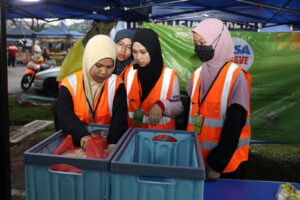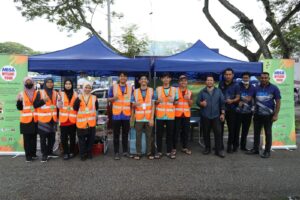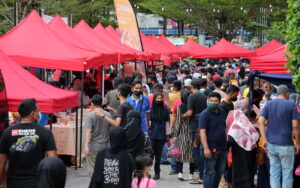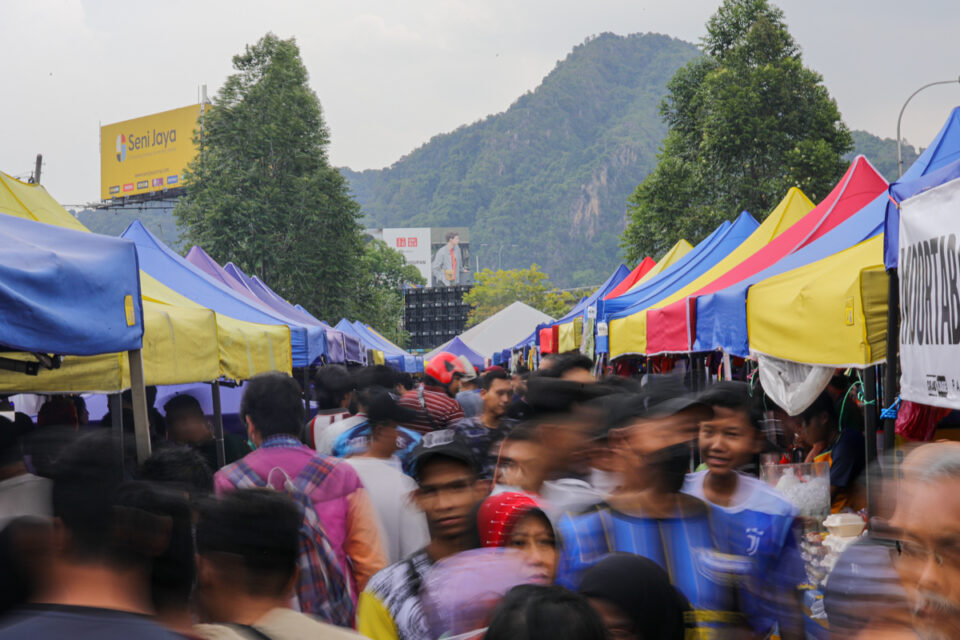By Abdul Rahim Sabri
SHAH ALAM, April 13 — Despite Islam proscribing wastage among its followers, a lot of unsold food and beverages available at Ramadan bazaars end up being binned year after year.
Ramadan, a sacred month reminding believers of doing good deeds and heavenly blessings, thus becomes a month of waste and forgetfulness for many members of the public.
To this, at least two organisations namely the Shah Alam City Council (MBSA) and Team Selangor, took it upon themselves to ensure that excess food does not end up being thrown away.
Via the MySaveFood programme, MBSA opened three food collection centres at the Ramadan bazaar in Section 7, Section 17, and Section 20, where the collected meals are distributed for free to the public.
Running since 2021, members of Universiti Teknologi Mara (UiTM) Shah Alam’s university volunteers’ brigade and from the NGO Pemuda Gema Malaysia assist in collecting and distributing the free food.

They record, weigh, and repackage the food before ensuring it is distributed to residents in housing areas and other locations, as designated by the respective local authority.
“The programme aims to avoid wasting excess food and drink and reduce domestic waste that will ordinarily end up in the landfills, instead having it distributed to residents,” said MBSA public relations officer Shahrin Ahmad.
As of April 5, 2.2 tonnes have been collected, including 1.1 tonnes of food and drinks, which were then distributed to 16 locations including flats, public housing projects, mosques, and suraus.
In 2021, MBSA collected 855.4kg of surplus food. The following year, it collected 2,294.4kg.
According to state-owned company KDEB Waste Management (KDEBWM), the collection from 10,524 bazaars encompasses seven local authorities, and saw a 45 per cent increase within the first week of fasting.

As of March 30, KDEBWM recorded approximately 73.67 tonnes in waste collection on a daily basis, day compared to 50.78 tonnes during the same period in 2022. This, it said, is due to the increase in business plots at bazaars.
The Klang Municipal Council recorded the most waste at 17.93 tonnes, followed by the Subang Jaya City Council (10.99 tonnes) Kajang Municipal Council (16.1 tonnes), the Selayang Municipal Council (13.48 tonnes), MBSA (8.89 tonnes), and the Sepang Municipal Council (5.18 tonnes).
Alongside MBSA, Team Selangor’s volunteers mobilised by the Selangor Secretariat for National Awareness and Volunteerism also carried out similar efforts from March 31 and April 10.
They collected food from the bazaars at Bandar Baru Ampang, Jalan Kebun in Klang, Lembah Subang in Petaling Jaya, Kampung Sungai Gulang-Gulang in Kuala Selangor, as well as restaurants in Section 4 and Section 10, Shah Alam.
Senior manager Sadina Suffian said they ‘see, smell and taste’ the excess food from bazaar traders, so as to ensure its quality is guaranteed.

“The food is separated and repackaged before being distributed to recipients. A sticker is pasted on each package to serve as a reminder to consume the food on the same day or immediately,” she said.
The packages are also distributed to mosque congregations, students, madrasahs, orphanages, as well as individual orphans or the disable residing in high-density population locations and suburbs.
Last year, Team Selangor collected 437.7kg of food surplus. including 134.3kg of food and 303.4kg of drinks, from 30 to 40 traders at the Section 3 bazaar in Bandar Baru Bangi.





